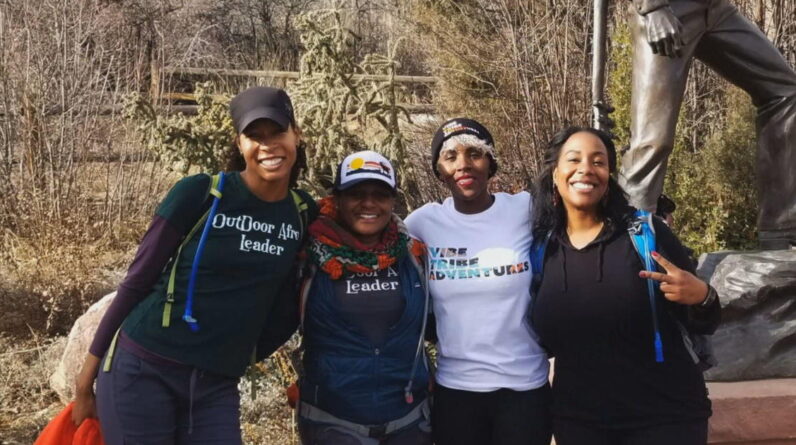
The 3.5 miles of trail was a chore for Stan Pentecost, but he loved it.
“The top of the world. We’ve done the whole cycle,” Pentecost said as she walked with Kia Ruiz and her son.
“They should call it the Winston Wildflower Walk. There’s at least 15 different varieties of everything up there and it’s gorgeous right now,” Ruiz said.
They were the first three to hike the newly named Winston K. Walker Loop Trail at Kittredge’s O’Fallon Park.
The trail is the first in Denver’s mountain park system to be named after a black person. Walker was iconic in breaking down barriers that prevented people of color from outdoor activities. Over a period of decades, he took thousands of people into the forest with him to experience nature.
“The first one hooked me,” Pentecost said of the excursion with his friend. Walker died in 2019, but in a dedication Monday, an unnamed trail in O’Fallon Park was named in his honor.
“Winston said to me before he died, ‘Jess, I have to teach you everything I know about the outdoors,'” said Jessica Newton, executive director and founder of Vibe Tribe Adventures. “I think I knew I was getting sicker and sicker and I’m grateful that he was able to be my mentor to really help carry on the next generation to encourage the black and brown community to adventure.”
Newton also helps bring people of color closer to Colorado’s wild places. Often the Vibe Tribe Adventures organization will bring groups of people for experiences they may never have tried. Recently there were a dozen young people.
“We took them to Florissant for three days and we were camping and he called us, but hey, here we are,” he said. “It gives them the education to feel safe enough to go back to their mothers and their friends and their family and it creates that generational change.”
Generational change is what he knows is needed. The Outdoor Recreation Industry in a 2022 study noted that 72% of outdoor recreation participants are white. Less than 10% were black or African American and slightly more than 10% were Hispanic. Without more diversity, the industry predicts that the percentage of outdoor recreation participants in the population as a whole could drop from 54% to less than 40% by 2060.
Creating a new future for minority outdoor recreation will involve moving on from a difficult past.
“We weren’t allowed to reserve spaces, to go into our national parks,” Newton said generations of discrimination. But you need to do more physical activity.
“Black women, in particular, have the highest rate of cardiovascular disease. So getting outdoors helps us mitigate diabetes and high cholesterol.”
The Vibe Tribe Adventures group and other groups like Girl Trek, where Ruiz has helped lead wilderness groups, are trying to get people to go places they might not have been.
“We go out in groups. We stay grouped for safety reasons,” Newton explained. “We’ve had park rangers call us. We’ve had the sheriff’s people call us. We’ve had the police call us and the question is ‘why are you here?’ and it’s like I have hiking boots, I have the backpack.”
It’s also about developing love for the outdoors and changing conversations. Newton talked about a typical conversation about his weekend at work.
“It’s like, ‘Hey Jess, what did you do?’ and like, oh, I went skiing in Vail and I went to Portugal and I climbed the highest mountain and then I ask my community what you did and they said, “Oh, it worked, you know” .
That, he believes, will help get more people to physically and mentally healthy places like the Winston K. Walker Loop Trail: “It’s changing the mindset that hey, I have a weekend, let’s climb together as a community.”
RELATED: Jefferson County family worries about the future of a lasting tribute to their loved one
[ad_2]
Source link





